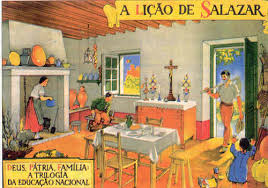The Portuguese suffer from what I
call the modernity deficit complex. Let me explain this with an illustration. Some
weeks ago, a friend of mine placed the
link to a video on her Facebook wall.
The message that accompanied the link, a message that received a fair number of
“Likes”, suggested that one could “safely substitute the Portuguese flag for
the Italian and you get a sense of life in Portugal...” The video itself is
hilarious. It consists of a contrast of two kinds of experiences in various
episodes in life; from attempting to cross the road at a zebra crossing, to
waiting for a bus, attempting to find parking, to political engagement. The
first experience is represented by a flag of the European Union, while the second,
which demonstrates the difference in Italian experiences from “the rest of
Europe” is represented by the Italian flag. The experiences of the EU flag are
what we all associate with the European experience, orderly, systematic, the
text-book case of what is ideal. The experiences of the Italian flag however are
a complete disaster. While in the EU case, one waits for a bus around five
minutes and then hops into it, in the Italian case, the bus takes well over an
hour to arrive, when it does, it leaves without the waiting individual. When
the politicians in the EU illustration systematically take their place in power
and leave it once their term is up, the Italian politicians, the video suggests,
refuse to let go, and grow tentacles to cling onto State power. The suggestion
of the video then, as well as its adoption by my Portuguese friend, suggested
that Italy and Portugal, were not really European, they were simply members of
the European Union, and failed to act genuinely European.

What was amusing about the video
however, was that one could have easily substituted the EU flag for a label
which said “modern” or “civilized”, and replaced the Italian flag for the
Indian to get a “a sense of life” in India according to a good number of India
critics. When we do this then, we get a sense of how the EU, both in its
self-representation and in its estimation by others, represents the civilized
norm. Clearly however, this norm, that is perceived as European, is not
uniformly experience by all Europeans equally. There are some Europeans, who
feel that they are not really European, but are only European in name. The
question that emerges then is, where exactly is this ideal Europe located?
Which are the countries that represent, not just for those outside of Europe, but
those within the EU as well, the European ideal, and in this process, ideal
modernity? Who are these ‘real moderns’?

One does not have to live very
long in Portugal to realize that these moderns are vaguely identified as ‘the
countries of the North’. Press further however, and this vague idea begins to
disintegrate, and one realizes that it isn’t even most of Northern Europe that
these impressions of modernity belong to, but more specifically countries like
Belgium, Holland, Germany, the Scandinavians. The scope of modernity therefore
is rather limited to a small set of Northern European democracies, democracies
that are marked by societies that are perceived to be rather well-ordered and
disciplined.

To return to the Portuguese
however, their self-flagellation about not being modern, continues in other
forms. Thus for example, the suggestion received on numerous occasions, whether
it be intimate conversations, or animated dinner discussions, that the
Portuguese do not have an educated elite. The grumble is that, unlike other
places, the Portuguese social elites, are not particularly educated, nor
cultured. One of the ideas that circulates for example, is that these elites in
a rather hierarchized society, are quite comfortable with not having to obtain higher
education, or read outside of the prescribed course work when they do take up
professional courses. The fact that they are well-born, and they are in
possession of plenty of money, is quite sufficient. One will recognize in this
description of the Portuguese, a possible description of Indian elites as well,
but let us leave this discussion for another moment and focus on the fact that
once more, the Portuguese imagine ideal norms of civilized, and hence modern,
society being located elsewhere, and not in their own country.

This idea of not being modern
enough however, can work both ways, both as self-criticism, and often strangely
enough, as a suggestion that we should be grateful for not being so messed up
like those societies that have achieved modernity. Take for example the rather
astute observation by another Portuguese friend. This friend pointed out that
the Portuguese translation of the popular American television comedy series,
Modern Family, is not a literal
translation. On the contrary, the Portuguese translation, which is
Uma Familia Muito Moderna (A VERY Modern
Family) has an interesting twist, given that it suggests, that it is not merely
a modern family we are talking about, but a VERY modern family. It has to be
stressed here, that this translation is peculiar not to the Portuguese
language, but only to Portugal, since the Brazilian translation is simply
Familia Moderna (Modern Family). The
family we are speaking about then, is deemed in the Portuguese case, to be an
example of an excess of modernity. The implicit suggestion then, is that too
much of modernity can be bad for you.

A glance at the storyline of
Modern Family may possibly help us
identify what is this modernity that is deemed as too much. The drama revolves
around three families, related to each other through Jay Pritchett, the
patriarch of this family, and his children, Claire Dunphy and Mitchell
Pritchett. Jay Pritchett commences this excess of modernity, not merely by
being divorced, but being married, as a white older man to a much younger
Colombian (hence coloured) woman Gloria. Together with Gloria, Jay raises her
son Manuel (or Manny), who is a somewhat odd boy, eminently cultured, way too
old for his years, and whose character partakes of an unsure sexuality. Will
the boy grow up to be gay, we are forced to wonder, or is he just extremely
cultured? Claire, Jay’s daughter, is a fulltime mother of three children and
married to Phil Dunphy, a real estate agent and man who just tries too hard to
be a ‘cool’ father. Being the only other heterosexual adult male in the drama,
his character struggles with some kind of desire for his step-mother-in-law.
The Dunphys have three children: Haley, the stereotypical teenager, Alex, the
smart middle child
, and Luke, the offbeat only son. Jay’s son
Mitchell, who is a lawyer, and gay, brings to this ‘modern family’ his (male)
partner Cameron, who while having grown up on a farm, and possessing various
skills that we identify as hyper-masculine, is best described as a flaming
queen. Together, they have adopted a Vietnamese baby, Lily, and together strive
to be good parents.

One will admit to some amount of
ambiguity to the name of the series in the US as well, but given that the
ambiguity already exists in ‘Modern Family’, one could also suggestion that
highlighting this ambiguity with ‘Very’ is a reference to the deep discomfort
that Portuguese society is expected to experience with regard to this otherwise
normal modernity. The suggestion then, is
that, this modernity is not us. We Portuguese,
are not like this. We prefer to be not quite so modern.
In light of all of this, surely
then, the Portuguese can be said to experience a curious relationship with
modernity, if not an outright Modernity deficiency complex?
In light of all of this, surely
then, the Portuguese can be said to experience a curious relationship with
modernity, if not an outright Modernity deficiency complex?
http://www.epaperoheraldo.in/Details.aspx?id=5211&boxid=23134328&uid=&dat=5/21/2012

No comments:
Post a Comment